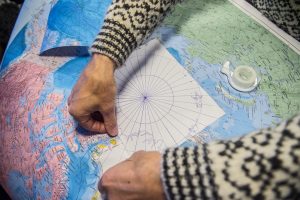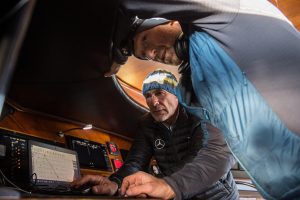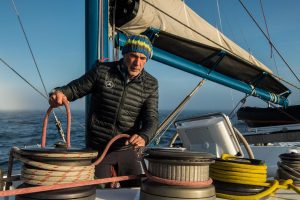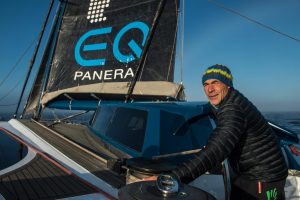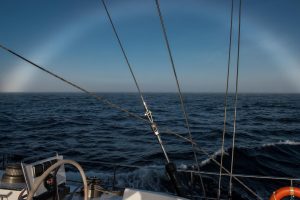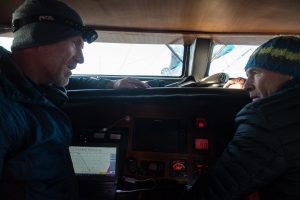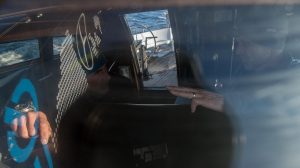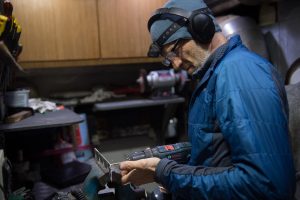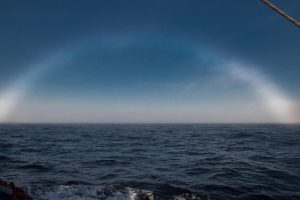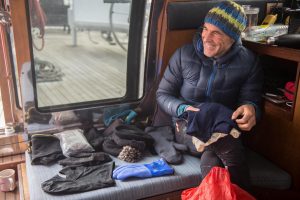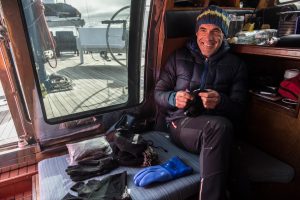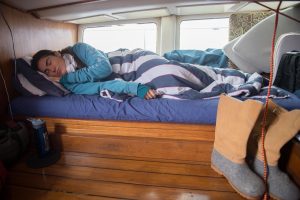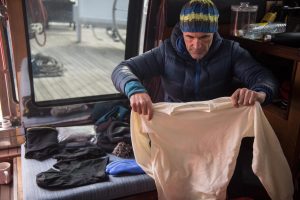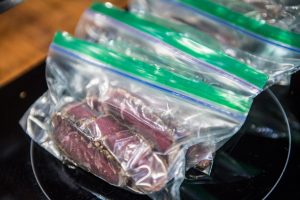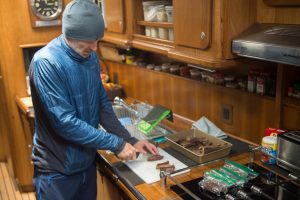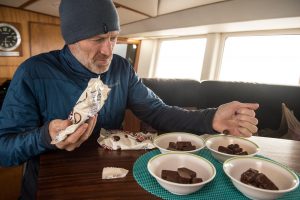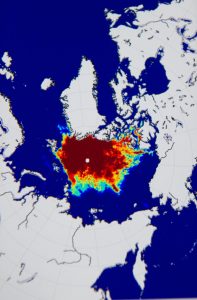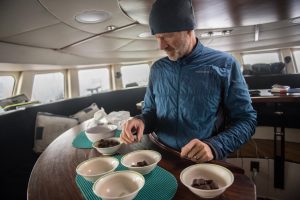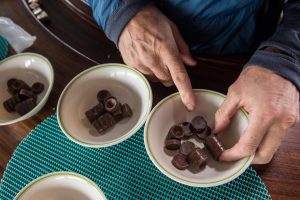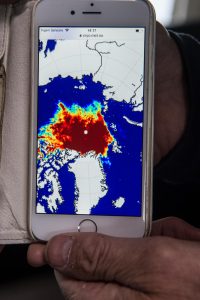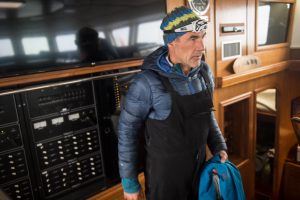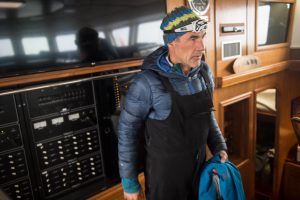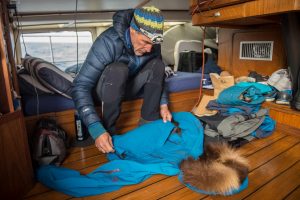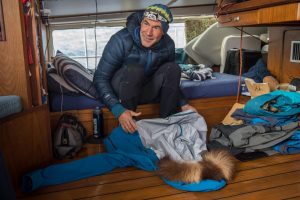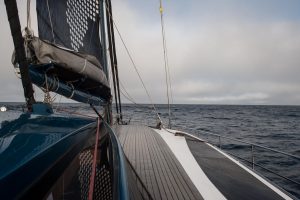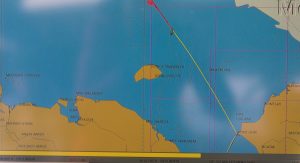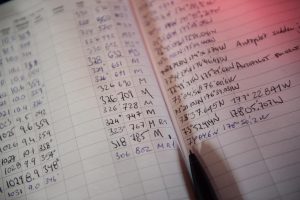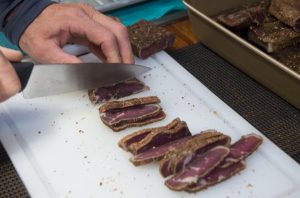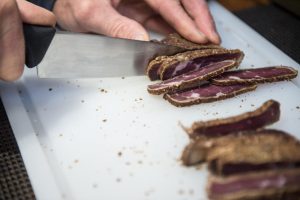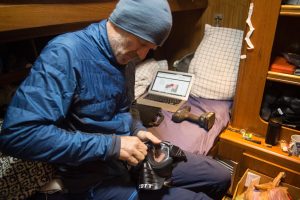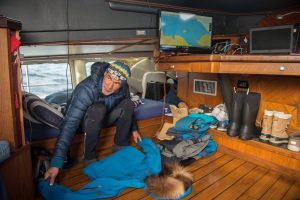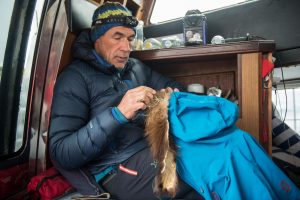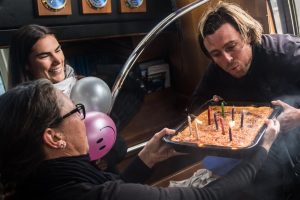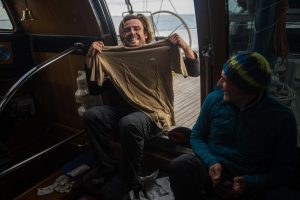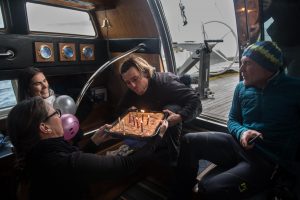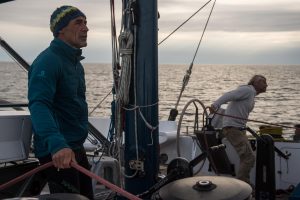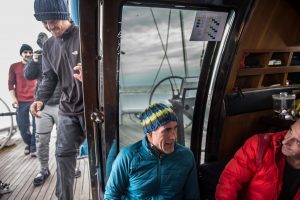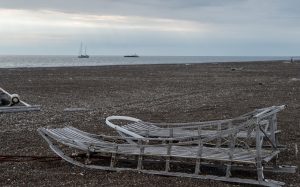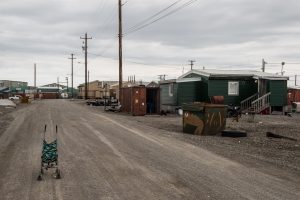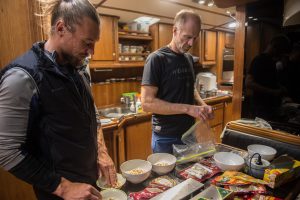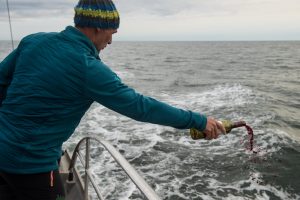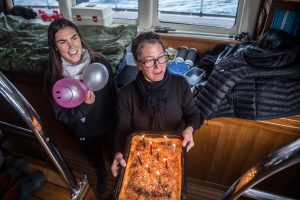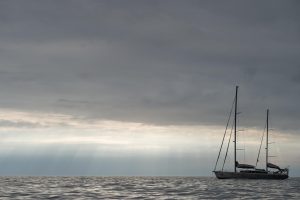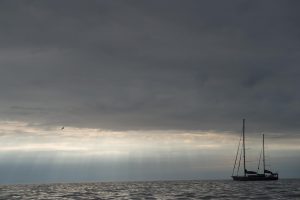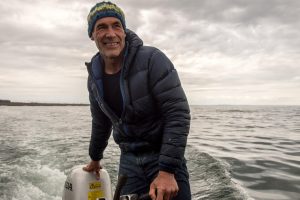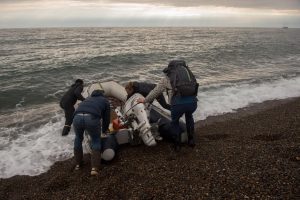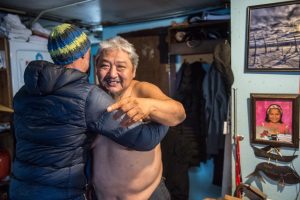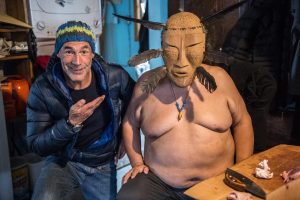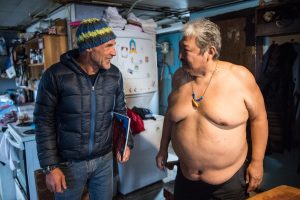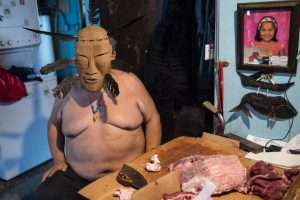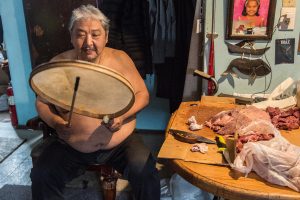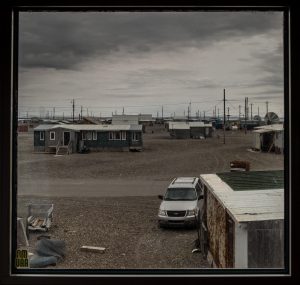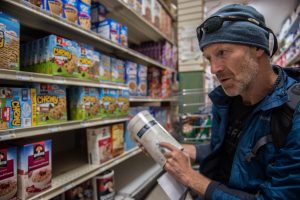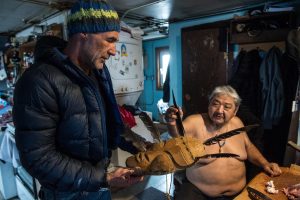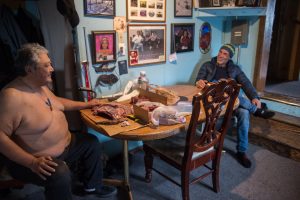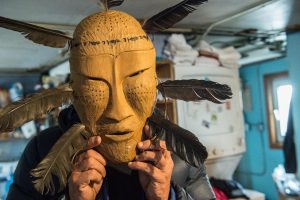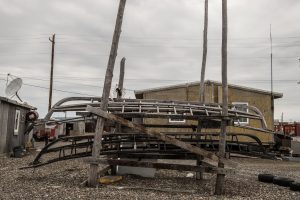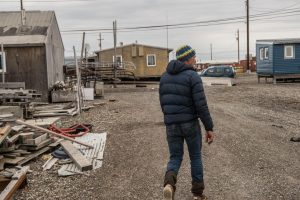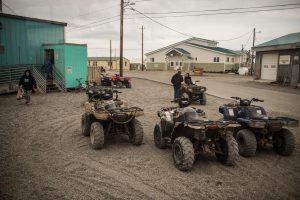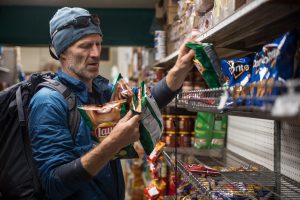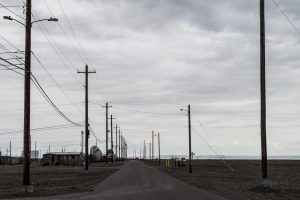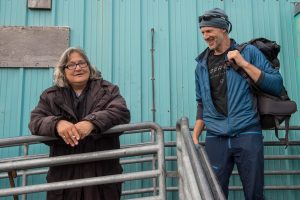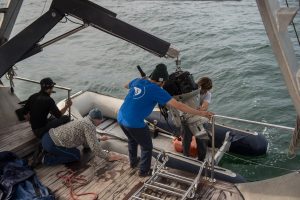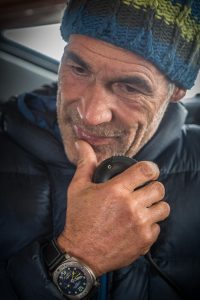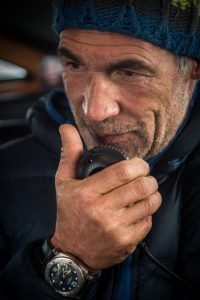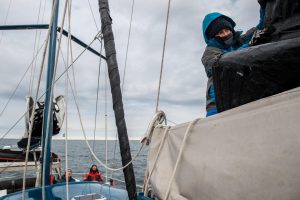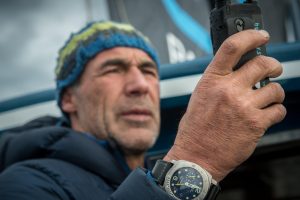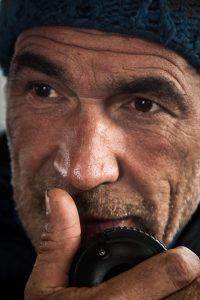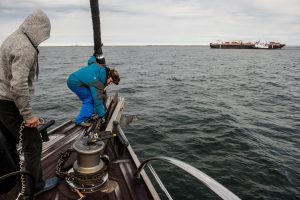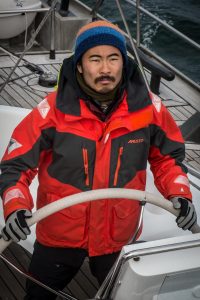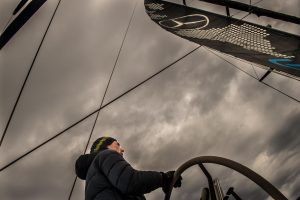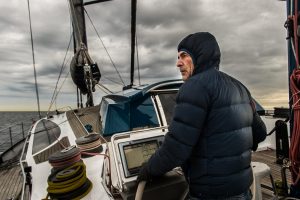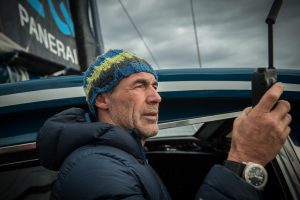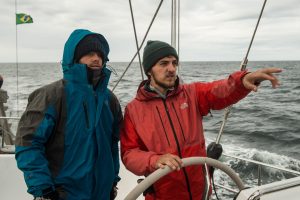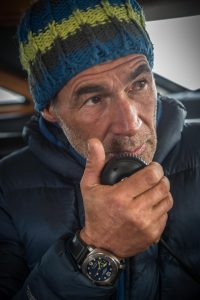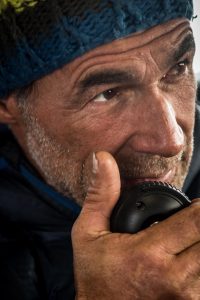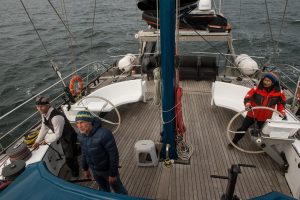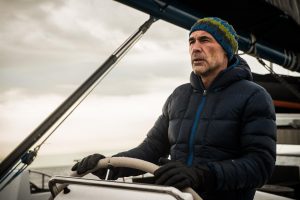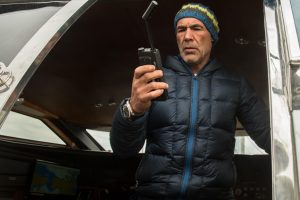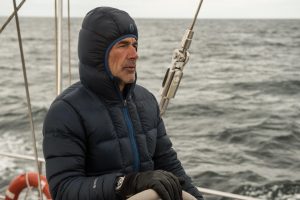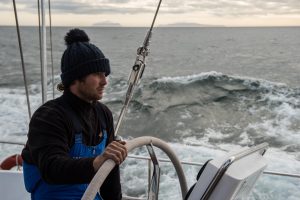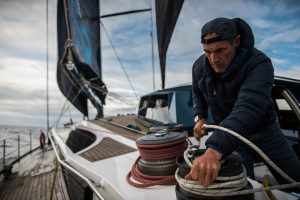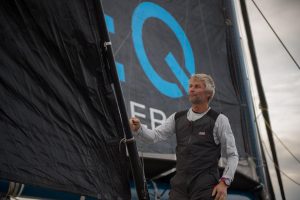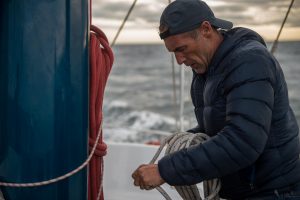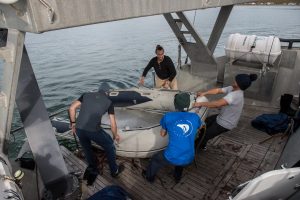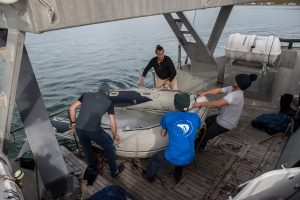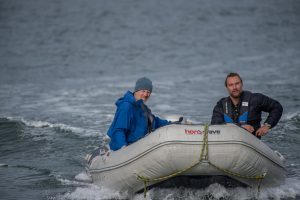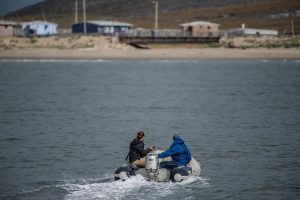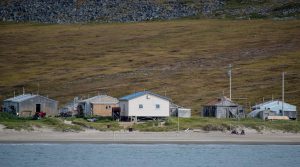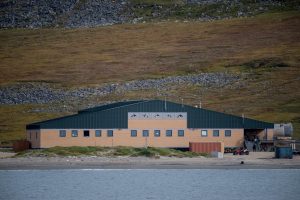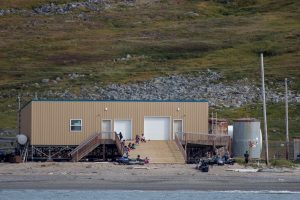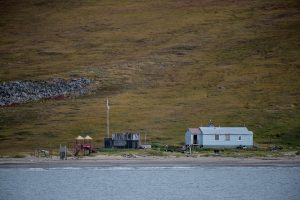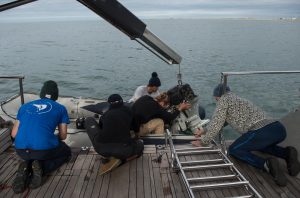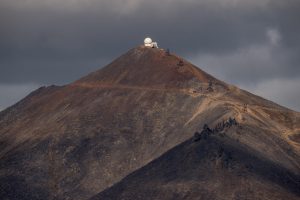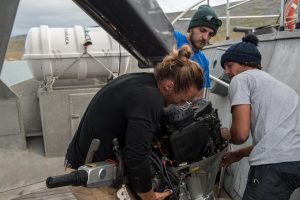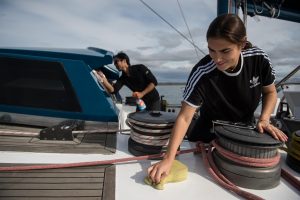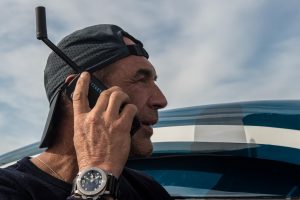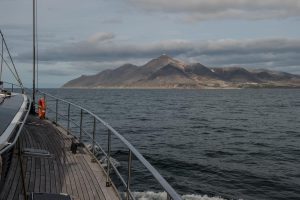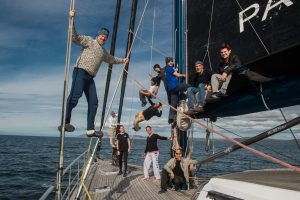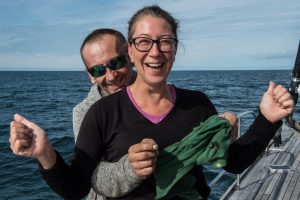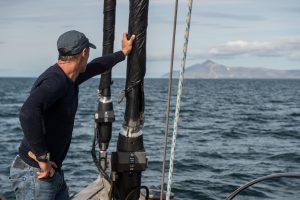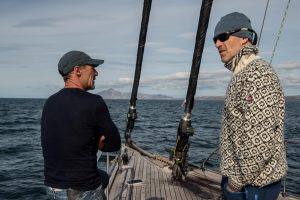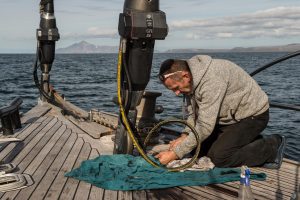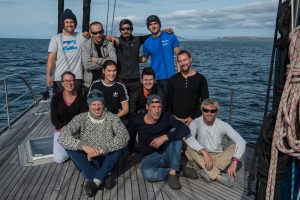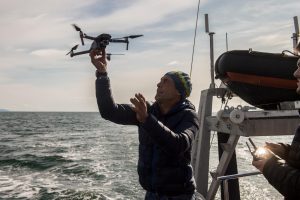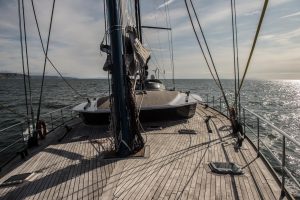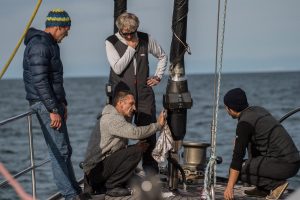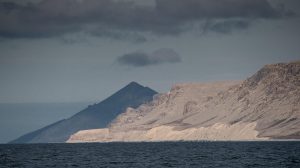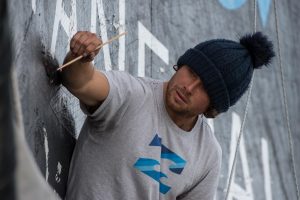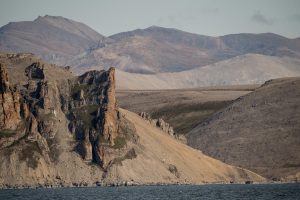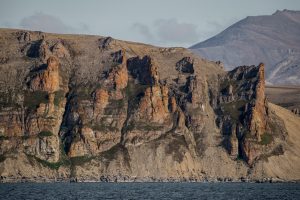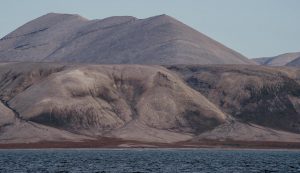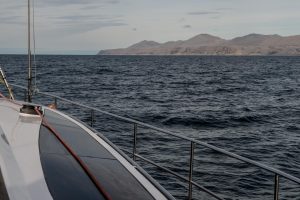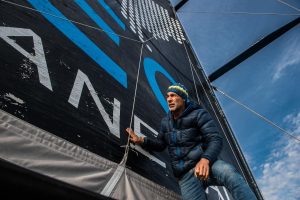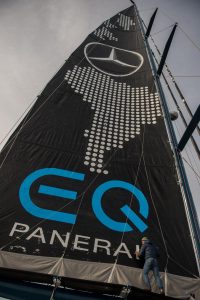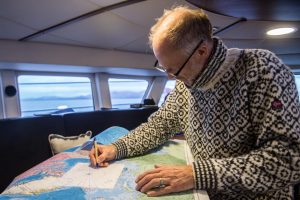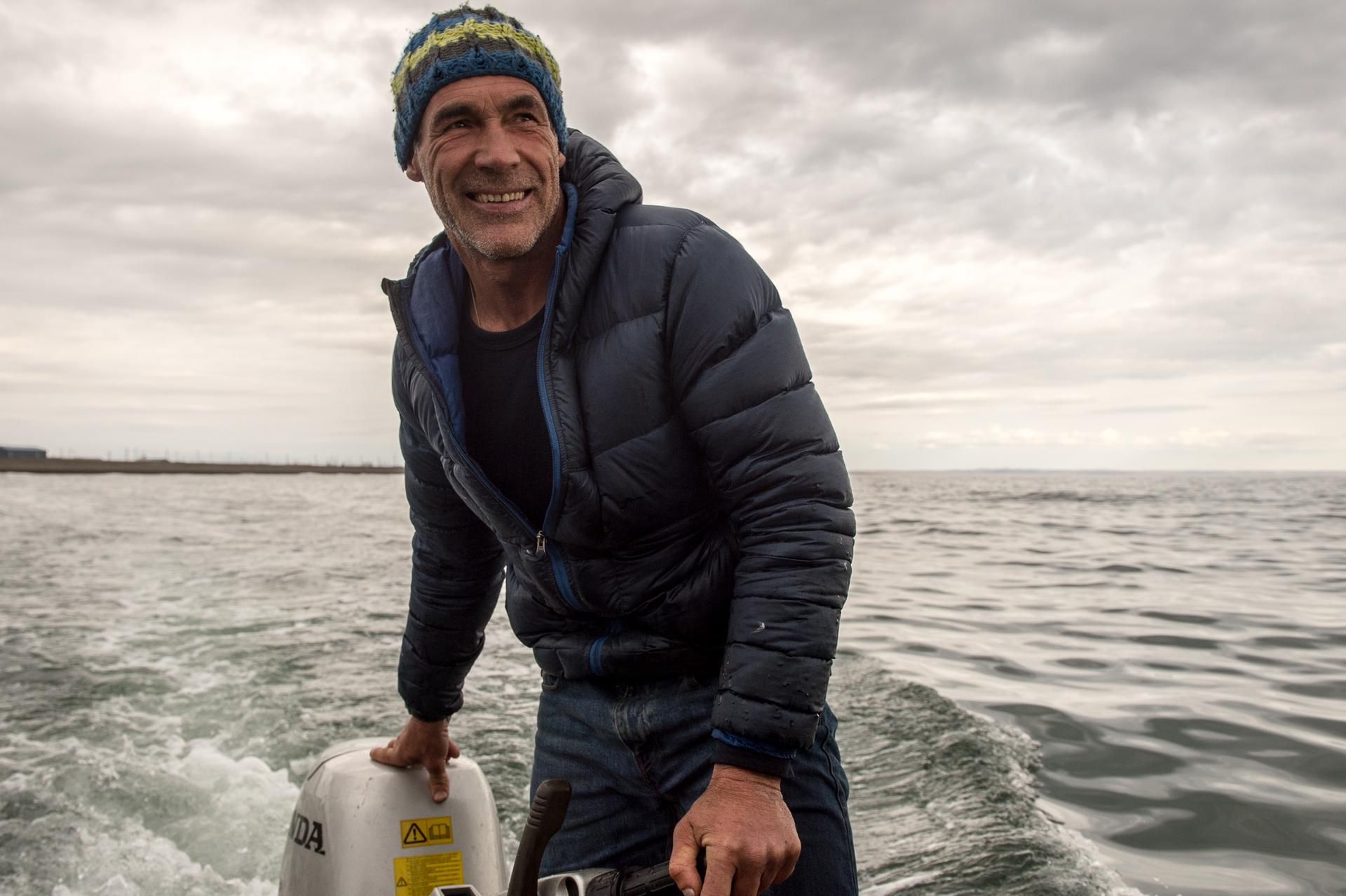
BLOG 4 – 05.09.2019 – Through the Bering Strait and into the Arctic Ocean
BLOG 4 – 05.09.2019 – Through the Bering Strait and into the Arctic Ocean
Just when we thought Pangaea’s issues were over and we could finally focus on our goal, the next problem came knocking on the door. As we left Teller and adjusted our course towards the Pole, our automatic piloting system gave in on us.
Pangaea’s never had so many unexpected issues. As always, I keep my positive attitude and don’t interpret these challenges as signals that the quest we have decided to undertake, might be a bad idea. On the contrary, I take these knocks on the door as small blessings in disguise. They serve to keep us alert and to develop a problem-solving attitude from the very start.
Too often, I see people give up on their dreams or even on their simple daily tasks because complications occur. “Things didn’t play out as I expected them to…now what do I do?!” It is exactly in this very instant that you have to put your head down and get to work. Because nothing in life that deserves to be achieved, will ever come easy. We’ve all become so used to things coming easy. I’m not sure what’s the cause of this…Maybe it’s due to the fast paced world we live in. Today’s world of abundant options has made it too simple for us to give up or look elsewhere, and in some ways even I have become a victim of this. It isn’t quite fair blaming our developing world for our increasing laziness. I’m all for a world of more opportunities, it certainly would have saved me quite some troubles in the past, but I’m not for a world where we forget what it feels like to invest genuine effort to achieve something we truly believe in. It’s not because things have become more accessible that we should take them for granted. Because at the end of the day, there is nothing more fulfilling than that feeling of achievement after having fought for something you believed was worth the sweat and tears.
I realise I have just gone deeper in my reflection than initially intended. But that’s what I tend to do. Minor issues remind me of the more significant problems our world is facing, or that we face as humans. All of this to say that Pangaea is putting us in yet another uncomfortable situation but I have decided to take it as a blessing rather than a curse.
With my problem-solving cap now on, I check the map for the next villages we could potentially stop in to get our autopilot back on track. It looks like the next town is a bit of a detour and would thus cause further delays. So I gather the crew and we make a vote. The options are the following: Either we make this detour, stop in a coastal village called Point Hope, with hopes of resolving the issue. OR we pursue our course towards the Pole, and navigate the same way as the explorers that inspired us, that is manually, at the helm 24/7. I immediately admit that I’m not against traveling the old-school way, making a point that automatic systems always fail, but manual systems never do! This decision is out of my hands however, as on this trip, I am no longer the boat’s captain my friend Bernard Stamm is. If all goes according to plan, Borge and myself will be jumping off the boat in a matter of days, whereas Bernard and the rest of the boat and media crew will still undergo another two-week’s sail through the Northeast Passage before reaching the island of Svalbard in Norway.
Votes in, we decide to make the detour and stop in Point Hope. After all, one day less or one day more shouldn’t really impact our expedition. Or at least, I try to convince myself that it won’t. By precaution, Borge informs me that he will still make the most of this premeditated stop to purchase extra expedition snacks to prepare spare portions in case we were to spend more time on the ice as initially planned (70 days).
Just like the Teller, the previous town we stopped in, I am quite familiar with Point Hope. It was another one of the stops during my Arktos expedition. Cathy, the girls and a bunch of friends had flown in to meet me there in 2003. I remember spending a great time with my loved ones there. We had visited parts of Alaska very few had ever traveled to. We had been guided by a local Inuit, Steve Umaktuk, who kept on reminding us that “two bones made one whale”, and he also introduced us to the local traditions such as the Inuit music, the dancing that goes along with it and made us discover a taste and a texture many of us could have lived without, whale and seal blabber. Just the thought of these fond memories, make me look forward to revisiting the small town, and hopefully similarly to what happened with Joe Garnie, I might end up finding my old buddy Steve Umaktuk somewhere!
Steve didn’t recognise me at first. When I told him I was from South African and Switzerland spent quite some time here over 15 years ago, he had even told me: “I have an old friend called Mike Horn who has a similar story”. It didn’t take him very long after that to put two and two together and to realise that it was me he was talking about. Just like Joe in Teller, Steve couldn’t believe I had just showed up out of nowhere with no forewarning. He invited us in his little home for coffee. Shirt off, he was busy chopping up caribou meat on the kitchen table. He was thrilled to see me, and so was I.
In the meantime, Jacek, the engineer, had solved the autopilot issue, which meant we could finally set sail again! Everyone onboard was out on deck and an excited energy was lingering around us, or maybe it was the delicious smell of freshly baked cake coming from the galley. Not that Laure needs a reason to bake cake, but today, was Sebastian’s birthday. Sebas, is the latest addition to Pangaea’s sailing crew. A young finance professional from South Africa, an old family friend, an intrepid who chose to celebrate his 27th birthday on a boat in the middle of nowhere. We never miss out on an opportunity to sing, smile and eat cake on this boat, and birthdays are always the perfect excuse. We made the most of having everyone out on deck to snap a quick group photo, first a civil one, which quickly turned into something more fun, truly portraying the dynamic ambience going on on Pangaea. Once our bellies were full of delicious cinnamon and apple cake, we finally made our way. A beautiful scenery bid us farewell. Rocky chunks of land fell into the open water. The cliffs shined in the afternoon sunlight. We were leaving the coast, this time for good…As we leave the coast behind us, I run inside and grab a bottle of wine and tell the crew to follow me. I go back on deck and pour some wine in the water to ask for Neptune’s blessing on this journey. Hopefully the God of water will appreciate this offering and send good currents our way.
Life onboard is lot more lively than one would imagine. There is no time to get bored when you’re 12 people on a 30m boat sailing in uncharted parts of the globe. We all have different roles here and we all work hard to fulfil them without getting in each other’s ways. It’s all about finding the perfect balance. Figuring out a way to live in synch in spite of the confined space. Because of the watch system we put in place, we each end up living at different times of the day. While some sleep, others are on duty, looking out for any obstacles along our course, or system blips. Then there’s Laure, in charge of the kitchen; Borge fully focused on prepping every detail of the expedition; Mike and Bernard, navigating Pangaea, with a little expedition prep when the conditions are calm; Jacek, head in the engine room; and the rest, juggle between watches and their media or deckhand tasks.
I’m happy with the team we’ve put together. Everyone gets on well and adds something unique to the group’s dynamic. With six youngsters under the age of 28, I sense a strong pull towards wanting to learn and contribute onboard, and that’s something that inspires me and gives me hope for future generations. This is a one-of-a-king experience for them to live and they’re all cherishing it to the fullest and learning valuable lessons along the way. I’d even say the same applies to the oldies onboard. Every adventure is entirely different and special in its on way. That’s what I love about exploration, no today will ever be the same as any yesterday! And as for what’s in store for tomorrow? Well, that is completely up to the unknown!
Juste au moment où nous pensions que les problèmes de Pangaea étaient terminés et que nous pouvions enfin nous concentrer sur notre objectif, le problème suivant est venu frapper à la porte. Alors que nous quittions Teller et ajustions notre route vers le Pôle, notre système de pilotage automatique a cédé sur nous.
Pangaea n’a jamais eu autant de problèmes inattendus. Comme toujours, je garde mon attitude positive et n’interprète pas ces défis comme des signaux que la quête que nous avons décidé d’entreprendre, pourrait être une mauvaise idée. Au contraire, je prends ces coups à la porte comme de petites bénédictions déguisées. Ils nous permettent de rester vigilants et de développer une attitude de résolution de problèmes dès le début.
Trop souvent, je vois des gens renoncer à leurs rêves ou même à leurs simples tâches quotidiennes parce que des complications surviennent. “Les choses ne se sont pas déroulées comme je m’y attendais… qu’est-ce que je fais maintenant ?!” C’est exactement à ce moment précis que vous devez baisser la tête et vous mettre au travail. Parce que rien dans la vie qui mérite d’être accompli, ne sera jamais facile. On s’est tellement habitués à ce que les choses deviennent faciles. Je ne suis pas sûr de la cause de tout cela… C’est peut-être dû au rythme effréné du monde dans lequel nous vivons. Le monde d’aujourd’hui, où les options abondent, nous a rendu trop simple pour abandonner ou regarder ailleurs, et d’une certaine façon, je suis même devenu une victime de cette situation. Ce n’est pas tout à fait juste de blâmer notre monde en développement pour notre paresse croissante. Je suis tout à fait pour un monde de plus d’opportunités, cela m’aurait certainement évité bien des ennuis dans le passé, mais je ne suis pas pour un monde où nous oublions ce que c’est que d’investir de véritables efforts pour réaliser quelque chose en quoi nous croyons vraiment. Ce n’est pas parce que les choses sont devenues plus accessibles que nous devrions les tenir pour acquises. Parce qu’en fin de compte, il n’y a rien de plus satisfaisant que ce sentiment d’accomplissement après s’être battu pour quelque chose qui, selon vous, valait la peine d’être transpiré et pleuré.
Je me rends compte que je viens d’aller plus loin dans ma réflexion qu’initialement prévu. Mais c’est ce que j’ai tendance à faire. Les problèmes mineurs me rappellent les problèmes les plus importants auxquels notre monde est confronté, ou auxquels nous sommes confrontés en tant qu’êtres humains. Tout cela pour dire que Pangaea nous met dans une autre situation inconfortable, mais j’ai décidé de prendre cela comme une bénédiction plutôt que comme une malédiction.
Maintenant que ma casquette de résolution de problèmes est en place, je vérifie la carte des prochains villages où nous pourrions éventuellement faire escale pour remettre notre pilote automatique sur les rails. Il semble que la prochaine ville est un peu un détour et causerait donc des retards supplémentaires. J’ai donc rassemblé l’équipe et nous avons fait un vote. Les options sont les suivantes : Soit nous faisons ce détour, soit nous nous arrêtons dans un village côtier appelé Point Hope, avec l’espoir de résoudre le problème. OU nous poursuivons notre route vers le pôle, et naviguons de la même manière que les explorateurs qui nous ont inspirés, c’est-à-dire manuellement, à la barre 24h/24 et 7j/7. J’avoue tout de suite que je ne suis pas contre les voyages à l’ancienne, faisant remarquer que les systèmes automatiques échouent toujours, mais que les systèmes manuels ne le font jamais ! Mais cette décision ne dépend pas de moi, car sur ce voyage, je ne suis plus le capitaine du bateau, mon ami Bernard Stamm. Si tout se passe comme prévu, Borge et moi sauterons du bateau dans quelques jours, tandis que Bernard et le reste de l’équipage du bateau et des médias passeront encore deux semaines dans le passage du Nord-Est avant de rejoindre l’île de Svalbard en Norvège.
Votes, nous décidons de faire le détour et de nous arrêter à Point Hope. Après tout, un jour de moins ou un jour de plus ne devrait pas vraiment affecter notre expédition. Ou du moins, j’essaie de me convaincre que non. Par précaution, Borge m’informe qu’il profitera toujours de cet arrêt prémédité pour acheter des collations d’expédition supplémentaires pour préparer des portions de rechange au cas où nous devrions passer plus de temps sur la glace comme prévu initialement (70 jours).
Tout comme le Teller, la ville précédente où nous nous sommes arrêtés, je connais bien Point Hope. C’était une autre étape de mon expédition à Arktos. Cathy, les filles et une bande d’amies étaient venues me rejoindre en 2003. Je me souviens avoir passé un bon moment avec mes proches là-bas. Nous avions visité des parties de l’Alaska où très peu de gens s’étaient jamais rendus. Nous avions été guidés par un Inuit de la région, Steve Umaktuk, qui n’arrêtait pas de nous rappeler que ” deux os ne faisaient qu’une seule baleine “, et il nous a également fait connaître les traditions locales telles que la musique inuite, la danse qui l’accompagne et nous a fait découvrir un goût et une texture dont beaucoup d’entre nous auraient pu se passer, la baleine et le blabber de phoque. Rien que de penser à ces bons souvenirs, j’ai hâte de revisiter la petite ville et, espérons-le, de la même façon que Joe Garnie, je finirai peut-être par trouver mon vieux pote Steve Umaktuk quelque part !
Steve ne m’a pas reconnu au début. Quand je lui ai dit que j’étais sud-africain et que la Suisse avait passé pas mal de temps ici il y a plus de 15 ans, il me l’avait même dit : “J’ai un vieil ami, Mike Horn, qui a une histoire similaire.” Il n’a pas mis beaucoup de temps à faire le rapprochement et à réaliser que c’était de moi qu’il parlait. Tout comme Joe dans Teller, Steve n’arrivait pas à croire que je venais d’apprendre
Pictures : Dmitry Sharomov
adventure, arctic, bering strait, Expedition, MikeHorn, north pole, P2P, pangaea, Pole2Pole, Sailing
